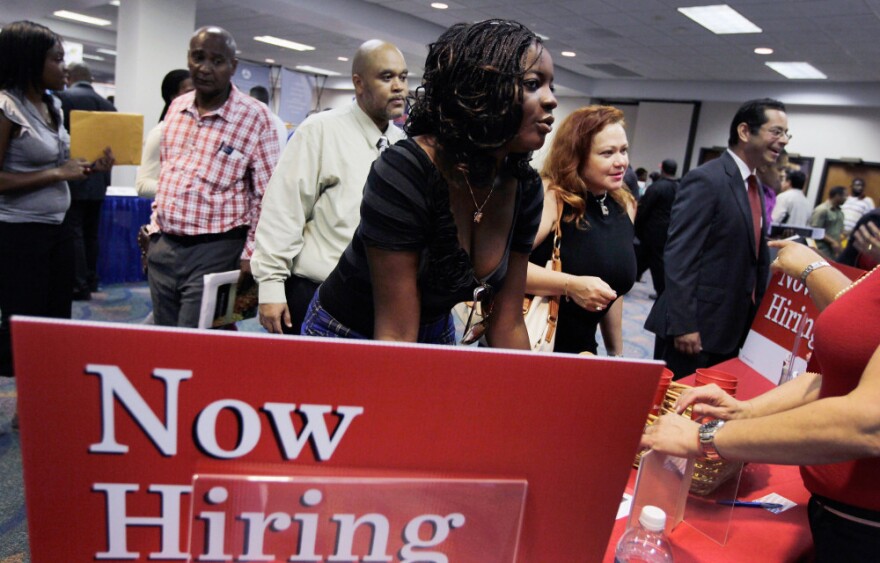When President Obama outlines his new jobs-creation plan on Thursday, business executives will be listening for anything in the proposal that might stimulate demand and allow them to start hiring.
Some possible details have already begun trickling out: The president is expected to outline a jobs package worth at least $300 billion that includes temporary tax cuts, an extension of unemployment insurance, new spending on infrastructure such as roads and bridges, and aid to states to keep people employed. He is also expected to announce new tax breaks for businesses.
Obama's speech comes amid further signs that the economic recovery is faltering and the U.S. employment outlook remains bleak.
Last week, the Labor Department reported that no new net jobs were created in August. And this week, the government said companies advertised more job openings in July than they had in nearly three years, but it also found that weekly applications for unemployment benefits rose.
Economists agree that jump-starting private-sector employment is the key to recovery, but what will it take to get businesses hiring again? NPR spoke with four CEOs in different industries about what might spur them to add workers:
What concerns in your industry have prevented hiring?
BOB MITCHELL, chairman and CEO of Mitchell & Best homebuilders in Rockville, Md.: "The biggest problem as I see it is a lack of consumer confidence. Consumers right now are in a complete state of uncertainty. People don't make big decisions, such as buying a new house, when they're uncertain."
SALLY SMITH, CEO of the Minneapolis-based restaurant chain Buffalo Wild Wings, points to several things, including fuel costs, price increases in commodities such as corn and beans, and "uncertainty around government mandates and regulations."
"When I talk to fellow restaurateurs, they don't know what impact health care is going to have on them. It's near the end of 2011; some of the new regulations [such as rules on wages and tips] don't come into effect until 2012," she says. "It's very difficult to plan. No one knows what's going to happen."
What will it take to get things back on track?
JOAN MAXWELL, co-founder and president of Edenton, N.C.-based Regulator Marine Inc.: "What it's really going to take is a flow of credit to consumers and small businesses. We do not sell our boats directly to the end-user. We sell them through a dealer network, so if the dealer cannot get credit, he cannot purchase our product and sell it to the consumer."
MASON HOLLAND, chairman and CEO of Albuquerque, N.M.-based Eclipse Aerospace Inc.: "It's not because of a lack of money. There's tons of money sitting on the sidelines in corporate America that's just not getting invested because there's no visibility as to where the economy is going over the next couple of years."
MITCHELL: "Under Dodd-Frank [act], regulations are going into effect that are making bankers petrified. Congress is also talking about implementing Qualified Residential Mortgages that would require 20 percent down payment to get a home loan. That should be taken off the table right now. Twenty percent down payments may have been all right 50 years ago, but the price of land and the price of houses has gone up faster than people's wages, and young people cannot afford it now."
What can government do?
MAXWELL: "I don't think that government can make things happen for us. I think they can make it easier for us by not telling the banks, 'Go lend money,' and at the same time tie the banks' hands with regulations where they can't lend the money. You can't have it both ways."
HOLLAND: "The more the government ... takes a position to sort of stay out of the way, it's probably better. Corporations don't really care what the policy is as long as the policy is stable.
"So now we are in this period of an unstable policy," she says. "We don't know what's going to happen — you don't know what's going to happen with the tax situation for corporations over the next 12 to 24 to 36 months. I think any kind of corporate tax cuts would stimulate the economy and help the aviation industry immensely."
SMITH: "Again, it comes down to uncertainty. The question is can government do anything to shore up consumer confidence so that [consumers] will start spending their discretionary dollars again."
What would you like to hear President Obama say in his speech?
MITCHELL: "Housing has always been the thing that pulled the economy out in the past. So far, the president has done very little to benefit housing. We hear him saying that those shovel-ready projects weren't as shovel-ready as first thought. I'm all for roads and bridges, but they take time.
"In housing, it doesn't take that long to get going again, and the reason we can't get going is that the number of people who are underwater in their houses or eventually facing foreclosure is so high. We need to do something about that."
MAXWELL: "What I would like to hear him say is that in order to stimulate jobs, we need to stimulate a need for the products being built. In order to do that, people have to have credit — they've got to be able to buy it in some way, shape or form. Just going out and creating jobs, you can't do it without demand. Demand drives the job market."
Copyright 2020 NPR. To see more, visit https://www.npr.org. 9(MDAxNDQ2NDAxMDEyNzU2NzM2ODA3ZGI1ZA001))


